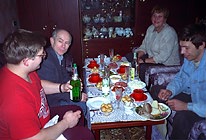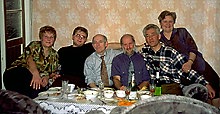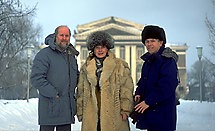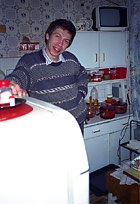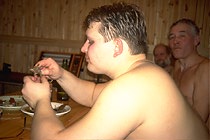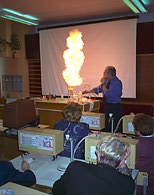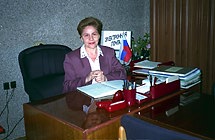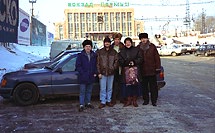Go to Chapter 6Zina. Zinaida Dmitrievna Belich, our host and Dean of the Chemical Faculty at Perm State University. Zina is the first female dean of this faculty in the 80 year history of the school. Most of our meals were taken at her apartment. Spoke very little English but we were able to communicate through Sergei. Powerful woman, formidable, someone who could arrange for front row seats for sold out ballet performances, etc. Usually very pleasant and cheery but could intimidate people under her. Well known on campus.
Tamara. Tamara Ilynichna Olin, Chairman Deputy of Civic Education for Perm. Tamara is 55-ish and a good friend with Zina. She and her husband Sasha attended a formal dinner with us at Zina's. Some tension at first. Ed and Sasha started exchanging fish stories. Fishermen have an universal affliction for exaggeration.
Sergei interpreted, a pensive uneasiness hung in the air as the fish got bigger and bigger. Sergei skillfully translated with diplomacy and finesse. No need to ignite an international scandal tonight. Finally Sergei translated "Sasha says he once caught a large fish that weighed over four tons." Ed wavered. Seconds hung like hours. Finally Ed had to smile and admit that was indeed a very big fish. A toast to big fish everywhere cleared the tension. (Secretly I was glad I had beat the Russian at ping pong a few nights earlier.)
Sasha. Nickname for Alexander Sergeiovich Olin, husband of Tamara. Sasha served 25 years as a surgeon in the Red Army. "I didn't just cut people. I healed them!" Five years stationed in East Germany. Left the base only once. Now retired. Fishes for big fish and still works as a surgeon for people, cats and dogs. Today he had two difficult operations, both on dogs.
Nikita. Son of Zina. A large young man, perhaps 250 pounds. Spoke some English. Always took seconds. "Nikky" passed his national accounting exam while we were in Perm. I suppose this is similar to the CPA, however most of the students pass it the first time. Nikky and Zina were very pleased as were we all. Celebrated at "banya."
Perm. City of 1.5 million people. Perm was closed to foreigners until 1990. Americans are still a novelty here. Tanks and cannons were built here during the Great Patriotic War. Wooden houses from 18th and 19th centuries are mixed with high-rise apartment buildings. The wooden houses are fun to photograph because of the ornate cut wood designs around the windows. Perm people do not like to live in the wooden houses because they have no modern conveniences. The center of Perm has a mall like Omaha's. Clean city, pretty, many spruce and birch trees. Perm is located along the Cama River and is surrounded by forest.
Maxime. A "new Russian," the name given to those who now have lots of money. Maxime picked us up in his newish Mercedes 200. Anxious to talk with us because he had just signed up for a 6-month, $10,000 English language crash course in San Diego. He asked a lot of questions about the type of new car to buy in America. My answers all addressed survival skills instead. Many "new Russians" had important connections to (or were themselves) old Soviet Russians. The power didn't change hands, just the names of the streets and towns.
Tramvye. Electric streetcar. Riding in the dark. Russian rush hour. People squished together. No way to move. I wondered how to get off at my stop. Complete silence as the tramvye rumbled along on its steel rails. Reflections in the window of proud, somber, silent faces. Fur hats.
Urals. The homeland and heritage of the people of Perm and other Ural cities. Perm people describe their city as being located "on the Urals." They are proud of the Urals for their natural beauty and extensive resources. Tall pines and spruces. Deep white snow. A beautiful yellow mineral called selenite is carved into animal shapes and sold in the stores.
Anna. Beautiful daughter of Tamara and Sasha. Anna is studying medicine and wants to be a surgeon like her father. She and Tamara accompanied us to the Perm Ballet one evening. The Perm Ballet started during the Great Patriotic War when the Leningrad ballet relocated to Perm for safety. Now Perm's is one of Russia's best.
Pelmeni. Staple food of Siberia. Pelmeni are little pieces of seasoned pork, beef and onions wrapped in a pastry made from eggs, water, oil and flour. (Recipe given at end of book.) In Siberia, bags of pelmeni are prepared in the fall and hung from the outside of houses, frozen. When needed, they are brought in and dropped into boiling water until they have floated several minutes. Very tasty. We ate a lot of pelmeni.
Riba. Russian word for fish. Fish and smoked bacon (looks raw, 80% fat) now seem normal for breakfast. I drink coffee and eat plenty of delicious Russian breads with jelly.
Banya. Russian sauna. The process is simple: Sit in the hot sauna for approximately 10 minutes and then jump into chilled water. The process is repeated perhaps eight times in a 3-hour period. Occasionally one relaxes with smoked carp and beer. Sasha, Ed, Sergei, Nikita and I visited a private banya (we were the only ones there) located under an elementary school -- an interesting perk for a chosen few. I suspect that very few people know about the banya located behind an unmarked door. Nikita ("Nikky") was especially happy to be at the banya for today he passed his exam. Nikky celebrated in earnest. Belly flopped into the pool screaming "Wowwww!" Water splashing everywhere reminded me of Sasha's big fish. I slipped and fell and cut myself. I hid the blood so Sasha wouldn't see the cut and want to work on me.

Our Programs. The first program took place in a large teaching laboratory. The room was so cold that we couldn't get alcohol to burn. Over 100 chemistry teachers and students studying chemistry education crowded around in a semicircle to watch and take notes. We had three or four sinks that we used because occasionally the water would stop working in one. When the water started up it would be rust red for a few minutes. Our three programs in Perm were a big success. Teachers crowded us afterwards to thank us and ask us questions. During one program I ignited a propane bubble with a candle. An elderly teacher jumped back, fearing for her life. When I handed her the candle to ignite the next bubble, the crowd laughed with approval. Chemistry texts. Currently not available due to lack of funds. Some teachers go to library during the summer to hand copy teaching materials from chemistry texts. My heart goes out to these teachers. They do so much with so little. Their spirits have not been broken. Could I be this strong?
Their Impressions. Teachers love our programs. Many heartfelt applauses. Occasional hugs of appreciation. People notice my chemistry and science ties. Everybody loves my 3-colored neon safety glasses and several teachers want Zina to buy them some when she visits the USA in March. I was told that the women like the way I look. I blushed red. She added that I remind them of Mendeleev! So much for the ego. Teachers are also amazed that I stand on the table for several demos.
Keys. Teachers turn in their keys at the end of each day at many of the schools and universities. Its not an issue of trust but rather one of concern that the keys may be lost.
Nikita. Seven hours after celebrating at banya, Nikky was dressed in a nice suit and off to his first day of work. He looked remarkably OK. At 10:30 he stopped by from work to say "Good-bye" to us as we prepared to head to the train. Big bear hugs.
We met so many wonderful people in Perm. I am struck by the inherent goodness of people in Russia. How could we have ever been enemies?
Da-svee-dan-ya.
Back to the Table of Contents
